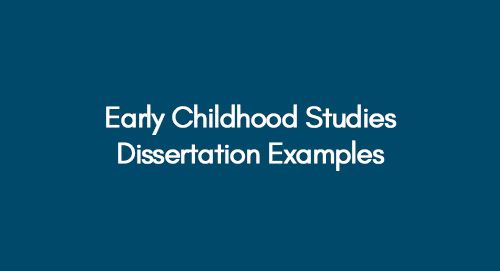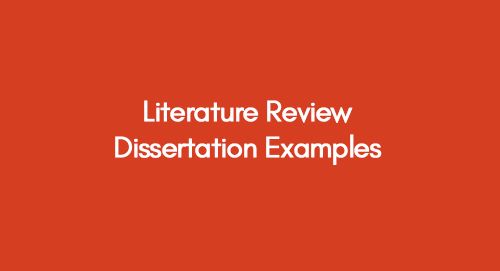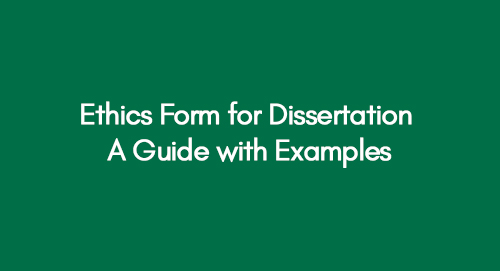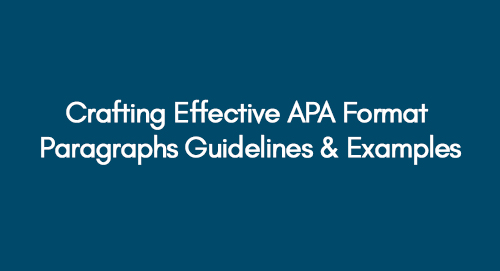
Marketing Dissertation Examples | Effective Structures and Essential Writing Tips
February 14, 2023
Latest Early Childhood Studies Dissertation Examples
February 14, 2023The evolution of science and knowledge starts with the cavemen and continues to date. Building on the shoulders of giants has proven to be a catalyst in propagating knowledge forward. We have designed this article to help you understand how to benefit from the available knowledge to make your research a success.
We have added many literature review dissertation examples, which you can download and review.
Here’s a list of successful dissertations from which you can fetch dissertation literature review examples.
Example: 1 Insight into Alternative Dispute Resolution and Its Execution
Example: 2 Influence of Socio-Physical Attributes on Individual's Weight
The above sample dissertation literature reviews will help craft an amazing literature review. Having a great literature review can significantly impact the success of your dissertation. A well-crafted literature review provides a strong foundation for your research, demonstrating your deep understanding of the existing research in your field.
What is A Literature Review?
Leading scholars define a Literature review as "a comprehensive survey of the existing research and scholarly knowledge related to a specific topic, subject or research question.”
Students are expected to conduct a thorough literature review when undertaking research, a master's thesis or a PhD dissertation.
A literature review is a detailed exercise to evaluate existing literature, identify gaps in the current knowledge, and make a case for the importance and relevance of your research.
It is typically a written document essential to a larger research project, such as a dissertation. It serves as a critical analysis of the existing knowledge in a particular field of study.
The key purpose of a literature review is to provide a comprehensive overview of the existing research, to demonstrate the researcher's understanding of the topic, and to provide a foundation for further research.
The Process of Conducting a Literature Review
1. Identify Your Research Question
Identifying the research question is the first step in your quest to find relevant literature. Always be specific while determining the scope of your research. Students make the common mistake of making a broad research question. It can lead to confusion while devising methodology and projecting outcomes. The broader the research question, the more literature you will need to digest.
For an Effective Literature Review, make sure your research question is
- Specific and to the point
- Directs you in a vivid direction
- Enables you to project outcomes
- Points you toward relevant literature
Skim through the following guide to make an appropriate research question.
Expert Tips on How to Write a Research Question with Real Examples
2. Searching for Relevant Literature
In modern academic settings, a lot of literature is floating around on almost any topic. Once you have finalized your research question, you can use a variety of sources to find relevant literature. Extended dissertation literature review examples are available on the Premier Dissertations thesis repository.
The following resources and knowledge repositories can greatly help your dissertation literature review.
- Online Search Engines like Google and Bing
- Academic Databases
- Google Scholars
- Library Catalogues
- Research Papers
- Academic Books
It is essential to use a systematic approach to searching for literature to ensure that you have a comprehensive and representative sample of the existing research.
3. Evaluate Research Quality
After finding the relevant literature, evaluate the quality of the sources. The quality of your literature review can significantly impact the quality of your dissertation.
Complete the following checklist to ensure the quality of the literature.
- Author’s Credibility
- Impact factor of the Journal in which research was published
- Publication house of the book
- Biasedness of the literature
- Limitations of the study
- Reliability of results
- Overall validation of the study
If a piece of literature checks all these boxes, you have quality literature for your study.
4. Synthesizing the Literature
It is the final step in your literature review. You will be organizing and summarizing the key findings related to your research question. Analyze the themes, patterns and key findings and structure the information in a coherent and well-structured argument.
It is important to consider how the literature supports or challenges your research question and highlight the existing research's strengths and weaknesses.
The synthesis should provide a comprehensive overview of the existing state of knowledge on your topic and should provide a foundation for your research. You can download the dissertation literature review example pdf from the link below.
Example: 1 Challenge of Waste Reduction in Ghanian Construction Projects
Qualities of a Good Literature Review
In light of the above discussion, the following are the top 10 qualities of a Literature Review.
- Relevance: A good literature review is focused and relevant to the research question or topic being studied.
- Comprehensive: It provides a thorough overview of the existing research.
- Up-to-date: A good literature review focuses on the most recent research, including the latest findings and developments in the field.
- Objective: It presents a balanced and impartial assessment of the existing research without showing personal biases.
- Well-structured: It is organized and structured clearly and logically for easy understanding.
- Evidence-based: It is based on strong evidence, including peer-reviewed research and reliable sources.
- Critical: Provides a critical analysis of the existing research, highlighting strengths and weaknesses and identifying gaps in the current knowledge.
- Synthesized: Synthesizes the key findings and themes from the literature into a coherent and well-supported argument.
- Well-written: A good literature review is well-written, clear, and concise, effectively communicating the significance of the research.
- Original: The literature review should provide an original contribution to the field, adding new insights and perspectives to the existing knowledge.
The following guide includes literature review Ph.D. examples and how to use systematic literature review dissertation examples to become a good researcher.
Avoiding Common Mistakes in Literature Review
Avoid these common mistakes to make your literature great from good
I. Vague Research Question
A clear and focused research question is key for a strong literature review. Avoid the mistake of not defining your research question in a clear and specific manner.
II. Limited Literature
You might feel like reading a few papers is enough, but it isn't. A comprehensive literature review is important, so avoid the mistake of not reviewing enough literature. Make sure to search for and include a broad range of relevant sources.
III. Irrelevant Sources
Stay focused on your research question when selecting sources for your literature review. Only choose sources that are relevant and useful. It will ensure a strong and effective literature review that adds value to your research and its findings.
IV. Ineffective Synthesis
When conducting your literature review, it's crucial to synthesize the key findings and themes into a clear and well-supported argument. Don't let disjointed and weak writing take away from the impact of your review. Instead, aim for a synthesis that effectively combines all your research's key elements.
Conclusion
In conclusion, this blog post has covered the key elements of writing a great literature review for a dissertation with the best literature review thesis examples. From identifying the research question to avoiding common mistakes, these examples of literature review will help you achieve your academic goals.
We hope you found the information helpful and are ready to implement these strategies. If you need further assistance, consult the professional writers at Premier Dissertations. They are always here to help you achieve success in your academic pursuits.
Consider the following resources to learn how to write various dissertation sections.
- How to Structure your Dissertation for Optimum Impact?
- How to Overcome the Feeling of Failure after Missing a Dissertation Deadline
- How to Use Primary Data in Your Dissertation
- Expert Tips on How To Write Discussion in Research Paper
- Dissertation Acknowledgements Done Right: A Guide on How to Write Acknowledgement for Dissertation
Get 3+ Free Dissertation Topics within 24 hours?



























